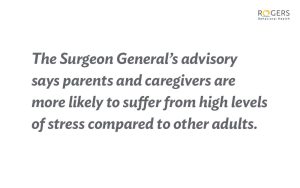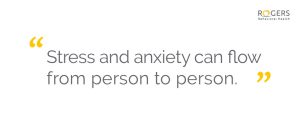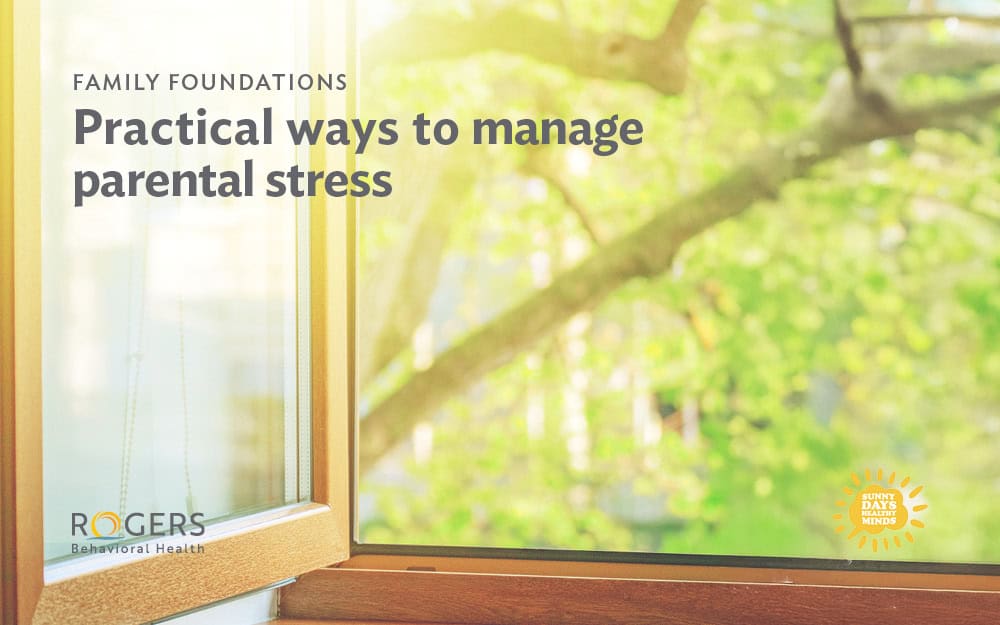While parenting and caregiving is deeply rewarding, it can also be very stressful. From balancing endless responsibilities to managing the emotional demands of loved ones, it’s easy to feel overwhelmed and as a result, experience mental health challenges.
In this 4-part blog series we’re calling, Family Foundations: How to Build a Stronger, Healthier Home, we will:
- Examine some common causes of stress and anxiety.
- Explore the stress cycle and why it’s important to complete it.
- Review parenting styles and how they affect children.
- Highlight 3 habits of healthy families.
We hope by providing practical tools and insights, you’ll be better equipped to navigate challenges and foster well-being for yourself and your family.
Rogers Behavioral Health’s Nicholas Mahoney, DO, psychiatrist and program medical director of OCD, Anxiety, and Depression Adult Residential Care, gets us started with an advisory from the Surgeon General and what parents and caregivers can do to protect their well-being.
What is the Surgeon General’s advisory about parents and caregivers?
Recently, the Surgeon General released an advisory about the mental health and well-being of parents and caregivers. Put simply, they’re more likely to suffer from high levels of stress compared to other adults.  That can have a negative impact on their mental health which can lead to challenges, like depression and anxiety. It’s important to increase awareness of this issue and begin conversations about how to better address this.
That can have a negative impact on their mental health which can lead to challenges, like depression and anxiety. It’s important to increase awareness of this issue and begin conversations about how to better address this.
Why do parents/caregivers seem to face more stress these days?
There are many factors today contributing to the stress parents and caregivers experience.
Technology: One stressor that I find more relevant today than in the past is technology and its influence on our lives. It can feel challenging to keep up with what children use in their social life or at school. The stress of social media alone can significantly affect our emotions.
Economic and financial strain. Providing the necessary resources for our families can add to our daily stress.
Time. It’s another resource that may always seem limited. Often, it may feel like there are more demands in our lives than there is time in the day.
Responsibility for another’s well-being. Being the primary person overseeing the safety and well-being of another person is a stressor that changes throughout the life of a child. When children are young, they’re highly dependent on a parent’s care — from nutrition and hygiene to general health and safety. This can cause stress. As children grow, they’re more independent, but that also presents challenges of its own. It becomes harder to regulate aspects of children’s lives which can lead to feelings of helplessness. In addition to the responsibilities of raising children, parents are also trying to balance their own lives. All of this can easily become overwhelming.
How can these stressors impact the mental health and well-being of parents/caregivers?
High levels of stress due to the factors mentioned above can lead to a variety of mental health challenges, including depression and anxiety.
Symptoms to watch for are:
- Lower energy.
- Decreased motivation.
- Difficulty completing tasks.
- Less enjoyment in activities.
- Racing thoughts, including catastrophizing.
- Trouble sleeping.
- Changes in eating habits.
How can the stress and anxiety of a parent/caregiver impact children?
When struggling with stress and anxiety, it may become difficult to get everything done. Fewer items on the to-do list may get checked off each day as stress builds.
 Parents also serve as the primary model for their children. Stress and anxiety can flow from person to person. When a parent/caregiver is struggling, that can influence the overall well-being of the family, causing children to also feel increased stress and anxiety.
Parents also serve as the primary model for their children. Stress and anxiety can flow from person to person. When a parent/caregiver is struggling, that can influence the overall well-being of the family, causing children to also feel increased stress and anxiety.
How can parents/caregivers protect themselves from too much stress?
I have five suggestions for how parents and caregivers can preserve their well-being and reduce stress, including prioritizing basic aspects of good health:
1. Get adequate sleep.
2. Eat a healthy diet. Our bodies get the energy they need every day from sleep and what we eat. Staying physically healthy can help with mental health.
3. Establish social connections. Loneliness can further increase stress, anxiety, and depression. It can be helpful to have someone to connect with or reach out to when times are hard.
4. Practice relaxation techniques, like mindfulness, deep breathing, or yoga which can lower the feelings of stress and help prevent the buildup of anxiety.
5. Reach out for professional help. A mental health professional can be a great guide in helping you manage stress and anxiety.
To provide much needed support and offer strategies for maintaining well-being, Rogers’ Community Learning and Engagement and WISE team offers the Parent and Caregiver Resource Guide, a free, fillable PDF for anyone to use anytime, anywhere.

Rogers offers compassionate care
We’ve been helping people find their path to well-being for more than 100 years. And we can help you find yours, too. Call 833-308-5887 for a free, confidential screening.
Part of our summer series, Sunny Days, Healthy Minds
Summer is right around the corner, and there’s never been a better time to prioritize mental health! Rogers is proud to introduce you to eight new offerings designed to fit busy summer schedules and address a variety of mental health concerns – without interfering with vacations and other beloved summer activities. Click here to learn more.



